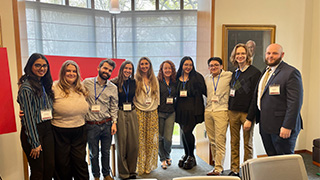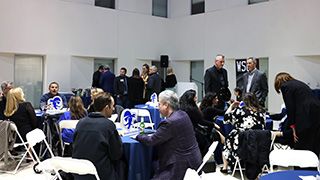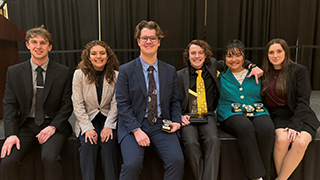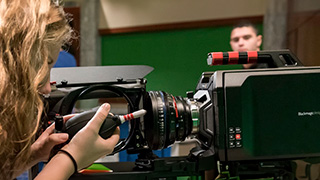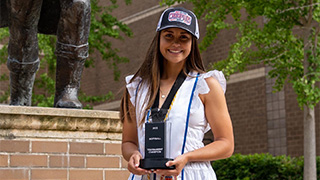University Class Hosts New Jersey Social Studies Coordinator
Monday, March 11, 2024
 In February, Ashley Woolsey-Greene, social studies coordinator in the Office of Standards
at the New Jersey Department of Education, presented a session for students in EDST
3003 – an elementary social studies methods course. This was the second time she has
worked with Seton Hall students this year. Her focus was on the New Jersey Student
Learning Standards (NJSLS) for Social Studies.
In February, Ashley Woolsey-Greene, social studies coordinator in the Office of Standards
at the New Jersey Department of Education, presented a session for students in EDST
3003 – an elementary social studies methods course. This was the second time she has
worked with Seton Hall students this year. Her focus was on the New Jersey Student
Learning Standards (NJSLS) for Social Studies.
Describing the importance of Woolsey-Greene’s visit, James Daly, Ed.D. a professor in the Department of Educational Studies within the College of Human Development, Culture, and Media, said, “Standards are widely misunderstood, by families, community leaders, even
educators.” As a result, the concept of social studies itself can become a controversial
topic. That’s why “understanding the standards, and how they can be used in planning,
delivering and assessing instruction is essential to educator and student success,”
added Daly.
During the session, Daly said that the class worked in small groups and analyzed performance
expectations while also designing lesson plans. “In the social studies standards,
the performance expectations describe the knowledge and skills students are expected
to demonstrate at the end of instruction,” noted Daly. “Each group was given a disciplinary
practice, another feature in the standards, to use as the guiding framework for their
lesson to ensure it was skill-driven and student-centered.”
Included in social studies disciplinary practices are developing questions and planning
inquiry, gathering and evaluating sources, seeking diverse perspectives, developing
claims and using evidence, presenting arguments and explanations, engaging in civil
discourse and critiquing conclusions, and taking informed action. Woolsey-Greene’s
session sought to bring these practices to the students so they are better prepared
to deliver productive social studies lessons. “As each group shared their proposed
lessons with the entire class, it was evident that the future elementary educators
were able to better understand and apply the standards because of Ms. Woolsey-Greene’s
presentation,” said Daly.
Reflecting on the session, student Jodiann Morgan said that she “truly enjoyed scaffolding
and debunking the framework of social studies.” She also was “allowed to explore more
themes and concepts of social studies and I was able to witness the breakdown of the
five disciplines of social studies.” Student Olivia Bernhart described the session
as eye opening because it gave her the ability to communicate social studies lessons
to students in a more impactful way. “I do not want to teach it the way I was taught,”
she said. Instead, she would use what she learned from the session to make her lessons
more memorable for students so they can learn more than she did as a young student.
About the College of Human Development, Culture, and Media
Seton Hall’s College of Human Development, Culture, and Media activates the synergies
of communication, education, and media to equip the change makers of tomorrow with
cutting-edge skills that drive social innovation. Through our interdisciplinary approach
to learning, our graduate programs embrace today’s digital culture while training
students to lead and solve pressing problems in their chosen field as well as society.
Graduates are prepared to practice in a multi-media world — whether that be as a multi-media
communicator, teacher, counselor, psychologist, school or law enforcement leader.
Visit here for more information on our Department of Educational Studies.
Categories: Education

